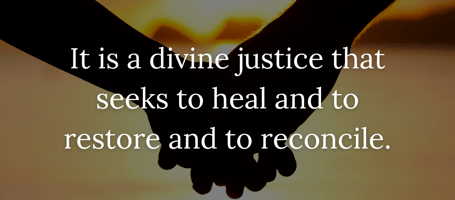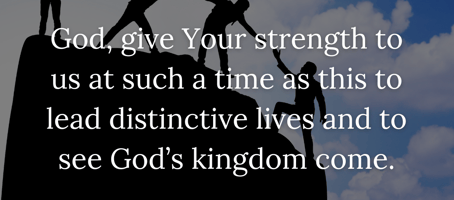This blog is based on a sermon by Pastor Teresa Howell-Smith on February 9, 2025
No Matter Our Situation, God Sees Us

This blog is based on a sermon by Pastor Teresa Howell-Smith on July 7, 2024
When we hear familiar stories such as those of Sarai, Abram and Hagar, it's easy to dismiss them because we’ve heard them so many times. Sometimes we gloss over their story as simply a feud among family. But recently, due to today’s divisive political climate, it's likely that when we revisit these stories, we can begin to relate.
Let’s try and approach this story from the perspective of Hagar. I remember I prayed after seeing news coverage of families being divided and cities being destroyed in Palestine. I prayed, “God, don’t you see it?”
My prayer that day was similar to Hagar’s prayer. I imagine families and mothers on both sides of the Gaza war praying, “God, don’t you see us in our distress?”
In an article published by Sojourners titled “When God Tells a Woman to Return to Her Abuser,” Katey Zeh writes: “[Hagar’s story] speaks to the experience of countless women and girls today whose lives are ravaged by domestic violence, labor trafficking, child marriage, sexual slavery and other abuses.”
Hagar’s experience is similar to an immigrant who is coming to America. They are promised a better life, but as soon as they arrive, their visa is confiscated and they are forced to either live in hiding or leave their new opportunities behind. Like immigrants coming to America, Hagar is promised a better life, but is instead shunned and outcast for jumping on the opportunity.
When Hagar becomes pregnant, Sarai does not feel relieved – she feels threatened. And as a result of the pregnancy, Hagar begins to look at Sarai with contempt. In Zeh’s article, she writes: “...I’ve often thought that this verse reflects Sarai’s insecurities about her infertility and her status as Abram’s wife.”
Perhaps Hagar’s pregnancy is not the root cause of Sarai’s anger – it is merely a catalyst. Zeh points out that Sarai herself was a victim of sexual coercion. When Abram and Sarai were together in Egypt, Abram made Sarai pretend that she was his sister – he was worried that because she was too beautiful, Pharaoh would become jealous when he saw them together. Abram said to Sarai, “If you love me, you’ll do this for me.” Sarai had no choice but to go along with the lie.
Sometimes, with our families and our own familiar ties, the things we are dealing with – the fights that we are having – are trauma responses. Sarai, having past experiences in being exploited, could have had more sympathy for Hagar. Instead, Sarai becomes the abuser. When Hagar becomes pregnant, there’s no longer a mystery as to where the infertility lies in Abram and Sarai’s relationship. Sarai becomes insecure and her anger is projected onto Hagar.
In the article “Hagar: Seen by God,” David Cramer writes: “Offering a concubine to a husband to produce offspring is not uncommon at this time, nor is this act of sexual exploitation considered violence. Hagar’s body and life are not her own …” Sarai puts the blame on Abram and points out that now that she is pregnant, Hagar looks differently at her. She says to Abram, “May the Lord judge between you and me.”
But Abram puts Hagar back in Sarai’s care, telling Sarai to “Do with her whatever you think best.” And so Sarai mistreats Hagar even further, and so Hagar flees into the desert for relief.
Can you imagine how hopeless Hagar must have felt? She was pregnant and forced to run away from the only home that she knew. We can somewhat relate to this story – at some point in our lives, we will have our backs against the wall. We’ll feel desolate and alone – like no one understands. Grief can make you feel like Hagar. Moving to a new city can make you feel like Hagar. A long marriage ending in divorce can make you feel like Hagar. These things can make you feel like Hagar did when she was hopelessly alone in that desert.
But God meets her in that desert. Even though Hagar is living in distress, she sees that God sees her. But there’s a tricky part to this story. The angel of the Lord tells Hagar to return home. How could we ever see eye to eye with a God that sends Hagar back to her abuser? Isn’t God supposed to send deliverance? It’s hard to gloss over the fact that religiosity has more than once encouraged the abused to return home to their abusers in the name of God.
But in the next verse, God provides a promise for Hagar and her unborn child. The angel of God tells her that her son’s lineage will be great. Her son’s name will be Ishmael. He is a man who will be at odds with other people, but who will truly be free. She goes on to give God the name El Roi, meaning “the God who sees me.” She asks herself, “Have I really seen God and remained living?”
For the first time in scripture, we have a person who names God. The moment Hagar meets God’s eyes from a place of despair, uncertainty and rejection, God calls Hagar by name and offers her dignity and tells her that he sees her whole person. He doesn’t just see her as a maid or a servant or a woman. God sees her as Hagar.
And so God declares a plan and a promise. He tells her to return to her mistress, but promises that he will give her more descendants than she can count. Hagar returns to Sarai and stays for 17 years.
Eventually, Sarah and Abraham (the names have changed slightly at this point in The Bible to indicate a change in the story) have a son named Isaac. One day, after Isaac was weaned, Sarah became angry at Hagar once again after realizing that Ishmael would inherit their family’s wealth. She confronts Abraham and makes him kick out Hagar and Ishmael. He prepares some rations and takes them both out to the desert. Eventually, their food and water run out and Hagar is ready to give up and die. Not wanting to watch her son die under the unforgiving desert sun, she sets Ishmael underneath a bush. But once again, God appears. The angel of God says, “What is the matter Hagar? Do not be afraid; God has heard the boy crying as he lies there. Lift the boy up and take him by the hand, for I will make him into a great nation.”
God opens Hagar’s eyes and she sees a well full of water. She quickly fills her water container and gives Ishmael a drink. God continued to stick with Ishmael as he grew up in the wilderness – he becomes an archer, and Hagar eventually gets him a wife from Egypt.
So, what can we take away from this story? I believe that Hagar’s story is a reminder that whatever circumstances you find yourself in, no matter what has pushed your back against the wall, God sees us. Sometimes we find ourselves waiting to be seen or waiting for the people in power to see us. But maybe it falls on us as a church to be the ones who see – to be the ones who welcome and invite. We need to put in the work to bring people back to wholeness and peace. Perhaps Hagar’s story allows us to remind ourselves or others that not everyone can escape the unfortunate situations they’re in due to systems in place or a lack of power.
So what is God calling us to do? Zeh writes:
“God is calling us to be the church that sees the sacred worth of those struggling to escape situations of abuse. When we read Hagar’s story, we have an important opportunity to reflect on and better understand the disturbing realities of domestic abuse – that for those whose lives are wracked by violence, bringing an end to the cycle of abuse is never simple or easy.
As we imagine Hagar’s pain as she makes the journey back to her abuser’s home, we can practice the sacraments of presence and compassion in the face of injustice. With open eyes and open hearts, we can work toward a more just, peaceful world for every child of God.”
I recently came across a quote that said: “Every woman that has walked with God has a story to tell. Sarah will tell you that nothing is too hard for God. Hagar will tell you that God sees you. Rahab will tell you that your path does not define you – that God can use anyone. Hannah will tell you that God answers prayers. Ruth will tell you that it's not over until God says it's over. Esther will tell you to trust God. God will exalt you in your timing. And the woman with the issue of blood will tell you that when all else has failed, God never fails.”
Hagar’s story tells us that no matter what our situation is, no matter where we find ourselves, God indeed sees us in our circumstances.
Hallelujah and amen.



